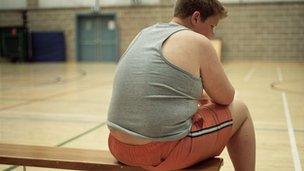C-section 'may double risk of childhood obesity'
- Published

Babies who are delivered through Caesarean section are twice as likely to become obese than those born traditionally, US research suggests.
Researchers from Boston Children's Hospital in Massachusetts found a doubling in the odds of obesity by the time the child was three years old.
The team said birth by C-section might affect bacteria in the gut, which in turn affects the way food is digested.
The study looked at 1,255 pairs of mothers and children from 1999 to 2002.
The mothers joined the study - published in the Archives of Disease in Childhood - before 22 weeks of pregnancy.
Their babies were measured and weighed at birth and this was repeated at the age of three.
Obesity risk
About one in four of the deliveries were C-section births and the remainder were vaginal deliveries.
The team found a link between body mass, skin thickness and how a child was born.
They also found that mothers who delivered by C-section tended to weigh more than those delivering traditionally - something which is known to influence obesity.
But the researchers said another possible explanation was the difference in the composition of gut bacteria acquired at birth between the two delivery methods.
They suggested expectant mothers who choose a C-section should be made aware of the obesity risk to their babies.
In the UK just over 23% of births are Caesarean.
Patrick O'Brien, a spokesman for the Royal College of Obstetricians and Gynaecologists, said: "This is an interesting study, but small. It needs to be replicated in a bigger sample."
- Published11 May 2012
- Published14 March 2012
- Published19 April 2012